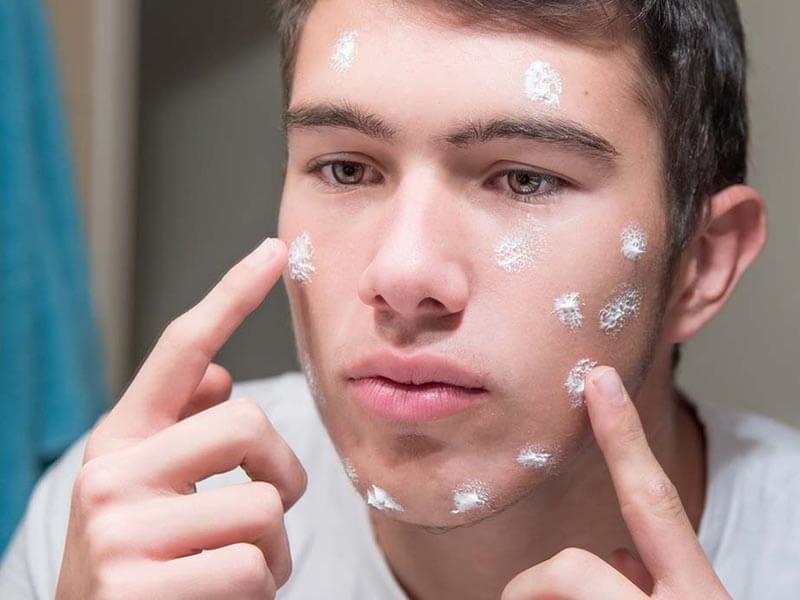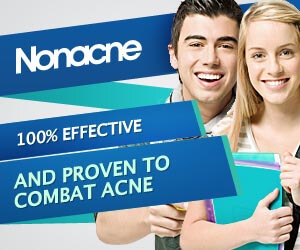Cystic acne is one of the most dangerous forms of acne with deep cystic lesions. What is a cyst? Generally speaking, it is an inflammation filled with purulent and cheesy-blooded content. We must realise that the cyst is the most serious skin lesion occurring in the case of acne. The lesions are small at first, but over time they start to grow up to a few centimetres. What does the appearance of a cyst on our skin depend on? The basic factors causing cystic changes include hormonal disorders and sometimes excessive sweating. Cystic acne is much more often an ailment that affects men than women, due to male sex hormones. At the same time, it should be mentioned that in the case of acne vulgaris, the risk of acne scars is very high.
Cystic acne is also known as lump cystic acne or nodular cystic acne. Let us remember that purulent cysts are not contagious, but when a pustule is infected with a bacterium, it is possible to pass the infection on to another person. Such a situation occurs only if we do not follow proper hygiene rules.
One of the first signs that we may be ‘falling prey’ to cystic acne are blackheads, which after a while turn into pimples and pearls. They in turn merge with each other and swell. It leads to the formation of cysts and nodules, which are filled with pus and are unsightly, painful and difficult to remove.
Table of content
Causes of cystic acne
The main cause of cystic acne is the excessive action of the sebaceous glands, which in turn causes the secretion of large amounts of sebum. Thus the keratinization of the epidermis of the canals leading out of the sebaceous glands. Too much keratinized epidermis causes closing of the outlet of the exit duct. It in turn leads to the formation of blackheads, which are an inflammatory form of acne. Let us remember that bacteria accumulating on the surface of the skin develop and cause inflammation which leads to greater complications.


It can therefore be said that the hormonal economy and genetic factors are responsible for the appearance of the cyst on the skin. There is a chance that if parents have had acne, we will also suffer a similar fate. This case mainly affects teenage boys in puberty and young men. Let us remember, however, that acne vulgaris does not choose and can attack people of different ages and sexes.
Excessive sweating also promotes the development of cysts on the skin. It is the hyperactivity of the sebaceous glands which is characteristic during adolescence, That makes the layers of the epidermis cornify and clog the skin, which stops “breathing” to form blackheads.
Studies show that the development of acne cystic acne is influenced by factors such as:
- certain medicines,
- using cosmetics that are too greasy,
- excessive sweating,
- certain chemicals.
Let us not allow ourselves to be led to believe that poor hygiene, inappropriate lifestyles or stress affect the development of acne vulgaris. Except when these factors do not affect the effect of hormones.
How does cystic acne manifest itself?
People suffering from cystic acne sense nodules under the skin as hard and painful skin changes. Unfortunately, the nodules are difficult to remove and in many cases leave unsightly scars, often of irregular shape. They can be observed on such parts of the body as the face, armpits and buttocks. Changes appearing on the face are easier to remove, but unfortunately they may reoccure. It is not recommended to squeeze or touch the cystic-negative lesions as they destroy healthy skin tissue and in this way we can lead to the spread of acne and consequently to the formation of scars.
Treatment of acne cystic acne
Unfortunately, due to cystic acne causing skin lesions, cystic acne requires the help of a dermatologist. There is nothing to hide, it is difficult to treat and requires very strong treatment which can last from a few to several months. The dermatologist is able to try out several ways of treatment, which include:
- antibiotic therapy – they are applied orally, they inhibit the multiplication of bacteria and at the same time soothe inflammation of the skin. The whole treatment consists of applying higher doses, which gradually decreases as the skin condition improves. Most often tetracyclines are chosen for this task. The size of the taken dose is always chosen by a specialist.
- Retinoids – isotretinoin for oral use – inhibit the activity of the sebaceous glands as well as prevent the multiplication of bacteria and have an anti-inflammatory effect,
- contraceptives with anandrogenic effect.
Let us remember that treatment can last several months, but it is really worth it, as the stabilisation phase follows. Let us follow the dermatologist’s recommendations, as the treatment process depends on individual factors. Even if the acne disease leaves scars on our skin, after the treatment is finished, they can be easily dealt with. Various types of aesthetic medicine treatments, such as peelings and laser treatments, turn out to be helpful for this purpose.


It is also worth mentioning that cystic acne is recurrent, so even after the symptoms have subsided, dermatological control and appropriate skin care is necessary. Are you wondering what proper skin care should look like in this case? The care of skin with acne vulgaris requires the use of high quality special dermocosmetics dedicated to acne skin. Delicate micellar liquids can be distinguished here, which effectively remove the remains of makeup. Skin toning should be performed with the use of tonics for oily acne skin, which remove too much sebum, but also restore the skin’s natural pH, reduce pores and have an astringent effect. To moisturise the skin, we should use a cream for oily acne-prone skin, containing substances with antibacterial properties.



